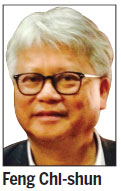Medical Council reform is overdue
Updated: 2014-06-11 06:38
By Feng Chi-shun(HK Edition)
|
|||||||||
It takes a celebrity couple, singer Peter Cheung Shung-tak and actress Eugina Lau Mei-kuen, whose legal wrangle with their obstetrician over the death of their newborn boy, to bring the inadequacy of our Medical Council into the limelight.
The case was finally settled last month - with the obstetrician being banned from practicing for two years - but the process took nine years!
A legal clich comes to mind: Justice delayed is justice denied.
In another case, a patient told a newspaper that she had so far spent thousands of dollars and three years, pursuing a complaint against her private orthopedic surgeon, who, she claimed had refused to provide follow-up care following HK$80,000-worth of knee surgery. She said that her case was complicated by the orthopedic surgeon's refusal to give her a copy of her own medical records. The Medical Council had not compelled the surgeon to release her medical records to her, and has apparently ignored her pleas for help. She ultimately had no choice but to file a complaint against the surgeon through the Medical Council. Like the celebrity couple above, she is spending a fortune pursuing the case, and is undoubtedly facing a long wait.

There is currently a public outcry for the Medical Council to instigate urgent reforms, to expedite cases, and to restore public confidence. One of the main changes urged by public affairs commentators, legislators, and patient concern groups alike is to have more laymen on the council. This call is probably based on the general distrust felt by the public of a closely knit profession which has typically been seen to take care of its own, and also accused of protectionism for its stance when barring fully qualified but foreign doctors from practicing locally.
That could be a misconception on the part of the public, because, from my experience as a local doctor, Hong Kong doctors are generally intolerant of colleagues who are incompetent and morally corrupt and will spare no effort in disciplining them. Nevertheless, if the public are to be fully convinced that the Medical Council's investigation of its own members for professional misconduct is not merely a hand-washing exercise, then having more laymen on the council is an essential first step in its reform.
Another legal clich comes to mind: Justice must not only be served; it must also be seen to be served.
The council is fully aware of its problems. In 2012, former chairwoman, Professor Felice Lieh-Mak, submitted a proposal to double the number of laymen serving on the council from the four currently required, to eight, out of a total of 28 members. As recently as April, the council proposed having two disciplinary panels, instead of one, in order to speed up the hearings. Secretary for Food and Health Ko Wing-man agreed to seriously consider the proposal.
Each year the council receives approximately 500 complaints for investigation. Every complaint is studied by the preliminary investigation committee, which rejects cases that its members find groundless or frivolous. On average only 22 cases per year make it beyond this stage to the disciplinary panel.
So what can be done to improve on the council's performance?
When it comes to medical reform, money and politics are never far behind.
Funding is required to hire more staff. Preliminary investigations and disciplinary hearings involve a great deal of paper work and phone calls. Clerical support is essential. Since most of the complaints about doctors are due to misunderstanding, it is necessary to hire experienced mediators to resolve conflict between patients and their doctors. With such a heavy workload, the council requires maybe two full-time doctors to go through the voluminous medical documents submitted by the complainants. Ideally doctors best suited for such work would be senior experienced doctors not interested in private practice, and hence have no reasons to fear repercussions for perceived persecution of their colleagues when necessary. Doctors serving the council in a voluntary capacity already have busy careers, and cannot possibly cope with the workload involved.
Extra funding is also required to pay for professional witness' opinions. There should be a roster of specialists available for consultation on demand, with an agreed payment schedule based on the time spent on the case. Written consultations would be paid more than verbal ones.
There should be two preliminary investigation committees screening the cases, to be followed up by the two proposed hearing panels when professional misconduct or malpractice is suspected.
Politicians can help stimulate reform by legislating for the mandatory surrender of patient records when requested by the Medical Council.
The call for Medical Council reform is nothing new; I have been hearing it for more than a decade. Perhaps this time we'll actually do something about it.
The author was a consultant pathologist for the Hong Kong government and St. Paul's Hospital before his recent retirement. He was a lecturer at the Medical Faculty of the Chinese University of Hong Kong and a diplomate of the American Board of Pathologists.
(HK Edition 06/11/2014 page7)